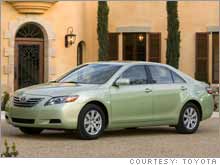Clearing up hybrid tax-credit confusionEither through errors or tricky rules, not all hybrid buyers will get the tax credit they had expected.NEW YORK (CNNMoney.com) -- If you bought a Toyota Prius last summer you may have thought you were entitled to a $3,150 tax credit. Not so fast. First, make sure you fill out the correct form. Following a story we published Friday about the cost-effectiveness of purchasing a hybrid vehicle, CNNMoney.com received an email from one reader who filled out the wrong form - she mistakenly asked for an electric vehicle tax deduction - and thought she was entitled only to a $1,000 tax credit, not the $3,150 credit she was actually supposed to receive. She's now filing an amended tax return. Best time to buy a hybrid car: Right now Several other readers wrote in to point out their problems with the Alternative Minimum Tax. That's a special tax that was originally created to prevent wealthy people from claiming lots of deductions and getting away with paying very little in tax. As the name implies, it basically sets a minimum amount you have to pay if you make a certain amount of money no matter how many deductions you have. If a family's taxes, figured the old-fashioned way, come in below the AMT amount, they have to pay the higher AMT. But the tax was never indexed for inflation since its 1970 inception. Times have changed and what used to classify as "rich" is now "upper middle class." So a lot of people you would never think of as really wealthy now have to pay the AMT. And that hybrid tax credit doesn't apply at all if you pay the AMT. To make matters worse, it doesn't apply - at least not completely - if you get anywhere close to having to pay the AMT. That's because, even if the regular tax amount you pay is higher than the AMT amount - meaning you're exempt from the AMT - if your hybrid vehicle tax credit would reduce your taxes to below the AMT amount, well, you just can't do that. That's why they call it the alternative minimum tax. In that case, you're only allowed to claim as much of the tax credit as you can without reducing the taxes you pay below the AMT amount. For example, lets say Bob, Jack and Jane each purchased a Toyota Prius in the Summer of 2006 and each was counting on that $3,150 tax credit. At tax time, Bob finds that for his income he's paying less in taxes than the AMT mandates, so he must pay the AMT. Bob gets no hybrid tax credit for his Prius. Jack's regular taxes, on the other hand, are well above what he would have to pay on the AMT scale. He gets the full credit he was expecting.. Jane doesn't have to pay the AMT, either. But her taxes are just $1,500 more than she would have had to pay under AMT. So, instead of the $3,150 credit she was expecting, she gets a credit of just $1,500. Finally, if you bought a Toyota hybrid vehicle last year, the date you purchased the vehicle will influence how much your tax credit is. Just in case you missed this detail: Because Toyota sold more than 60,000 hybrid vehicles last year, tax credits for those vehicles began phasing out after September. So, if you bought your Toyota hybrid in the last three months of last year, you can claim a credit of only $1,575, not the $3,150 you would have gotten if you'd purchased it earlier. Also, the tax credits do not apply to leased vehicles and only apply to vehicles purchased new, not used. Figuring out how much of a this particular tax credit you're actually entitled to is another very good argument for hiring a professional, using tax software or doing your taxes on-line instead of trying to sort it all out with paper and pencil. Be prepared, though. The answer could be disappointing. Best time to buy a hybrid car: Right now Review: New Mariner Hybrid: Nice and green Review: Camry Hybrid: Save gas, get pat on back Hybrids: Seven worries, seven answers Gallery: Alt-power cars Gallery: 10 greenest cars |
|

